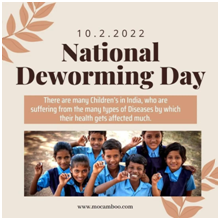
Parasitic worms or helminths, present in the soil, enter people and animals through the soles of their feet. These organisms can also infiltrate our bodies through worm-infested food or by touching infected faecal matter. The worms attach to the intestines and cause weakness, anaemia, indigestion, weight loss, abdominal pain, diarrhoea and vomiting. The worms may even enter the brain. Dewormers paralyse or kill adult worms. National Deworming Day is observed on February 10, to make people aware of the importance of deworming, particularly for children from 1 to 19 years of age.
About 241 million children in India between 1 and 14 years of age are at risk of infections from Soil-Transmitted Helminths (STH) and resulting anaemia and other health issues. As per the National Health Portal (NHP) website, about 7 in 10 children between 6 to 59 months of age have anaemia, especially in rural areas. To remedy this situation, the Union Ministry of Health and Family Welfare launched the National Deworming Day initiative, in the year 2015. The first programme was conducted in February that year and has continued annually since.
Parasitic worms are a menace to society, both for people and animals. It is impossible to prevent worm infestation since children come in contact with soil while playing outside. Worm infestations can reduce the quality of life in children, stunt their physical growth and mental development. This may lead to poor productivity in schools, affect their attendance and hamper their education and future. Hence, timely and proper deworming of children is a necessity.
Author
Karen Adrenaa K I MBA
2022-02-10